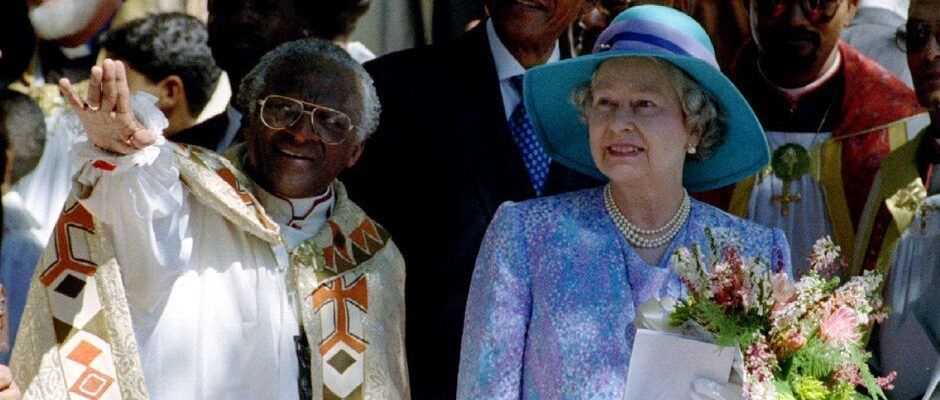South African Anglican Archbishop Desmond Tutu, icon of the fight against apartheid and Nobel Peace Prize winner, died Sunday at the age of 90, announced President Cyril Ramaphosa.
He was a laugh, an energy and above all a conscience. Former South African Archbishop Desmond Tutu died on Sunday at the age of 90, after a life of combat, first against apartheid and then for the reconciliation of his country and the defense of human rights. Until his last breath, the Nobel Peace Prize winner imposed his small round silhouette and his legendary outspokenness to denounce injustices and chip away at all powers, whatever they may be. Weakened, for some time he no longer spoke in public. But he greeted journalists, with a smile or mischievous look, on each of his recent outings, during his vaccine against the Covid or an office for his 90th birthday.
“It’s a great privilege, an honor that people think that your name alone can make a difference,” the Anglican priest told AFP in 2011. If they inspired the crowds, Desmond Tutu’s commitments also have very irritated. His Anglican church for example, when he defended the rights of homosexuals (“I could not worship a homophobic God”) or, more recently, the right to die with dignity. China too, whenever he sided with the Dalai Lama. Or the successive South African governments, whose turpitudes he denounced. Even his friend Nelson Mandela did not escape his wrath. When he came to power in 1994, Tutu criticized his African National Congress (ANC) for a “profiteer” mentality. His beliefs were firm, but “the Arch”, one of his nicknames, always stood up for them with joyful exuberance. Willingly joking, including at his own expense, he did not hesitate to embellish his speeches with a few dance steps and a laugh close to the chuckle that has become his trademark.
“Rainbow nation”
Desmond Tutu gained notoriety during the worst hours of the racist apartheid regime. While a priest, he organized peaceful marches against segregation and pleaded for international sanctions against the white regime in Pretoria. Only her dress will save her from prison. His nonviolent fight was crowned with the Nobel Peace Prize in 1984. With the advent of democracy ten years later, the one who gave South Africa the nickname “Rainbow Nation” presides over the Truth and Reconciliation Commission (TRC) which, he hopes, should enable the country to turn the page on racial hatred.
“I walk on clouds. It’s an incredible feeling, like falling in love,” he says. “We South Africans are going to become the rainbow people of the world.” His hopes were quickly dashed. The black majority has acquired the right to vote, but remains largely poor. Faithful to his commitments, the “priest” of Cape Town then becomes the slayer of the excesses of the ANC government, starting with the mistakes of former President Thabo Mbeki in the fight against AIDS. In 2013, he even promised never to vote for the party that triumphed over apartheid again. “I did not fight to drive out people who thought they were junk gods and replace them with others who think they are too,” says Tutu.
“Temerity”
A tireless campaigner for racial unity, in 2011 he was not afraid to propose a tax on the wealth of whites alone to correct inequalities. “They took advantage of apartheid,” he pleads. Abroad, we can also see it in all theaters of conflict, DR Congo, Sudan, Kenya or Palestine. He calls for judging Western leaders for the Iraq war. Along the way, he won the hearts of many personalities. The Dalai Lama makes him his “spiritual elder brother”, US President Barack Obama “a symbol of kindness and peace”. And the last white South African president Frederik de Klerk confessed “immense respect for his temerity”.
Nelson Mandela even made him a saint. “God is waiting for the Archbishop, he will welcome him with open arms”, he wrote. “If Desmond arrives in Heaven and is refused entry, then neither of us will enter.” Conversely, former Zimbabwean President Robert Mugabe, whose dictatorial drift he has crushed, accused him of “a bad little man in a robe”.
When asked about his fame, the Archbishop smiled. And thanked his family for helping him keep his feet on the ground. “My wife put a sign in our room that said ‘you have the right to have your wrong opinions’,” he said. “They are there to deflate the high opinion I have of myself!”
Staggering vitality
Desmond Tutu was born October 7, 1931 anonymously in Klerksdorp, a small mining town southwest of Johannesburg. As a child, he suffered from polio. Marked by this experience, he wanted to become a doctor but gave it up for lack of means. He will be a teacher, before resigning to protest against the inferior education reserved for blacks and entering seminary. Ordained a priest at the age of 30, he studied and taught in the United Kingdom and Lesotho, then settled in Johannesburg in 1975. Before being appointed Archbishop of Cape Town and head of the Anglican community in his country.
He had been married since 1955 to Leah, by whom he had four children. Despite prostate cancer diagnosed in 1997 and several hospital stays, this man of astounding vitality only very gradually withdrew from public life, sharing a Twitter account with his daughter Mpho, who runs his Foundation. . Until the end, he clung to his dream of a multiracial and egalitarian South Africa. On the death of Nelson Mandela in 2013, Desmond Tutu woke up a boring official ceremony by shouting a powerful “yes” to the crowd after having launched “we promise to God that we will follow the example of Nelson Mandela!”
Any reproduction prohibited
